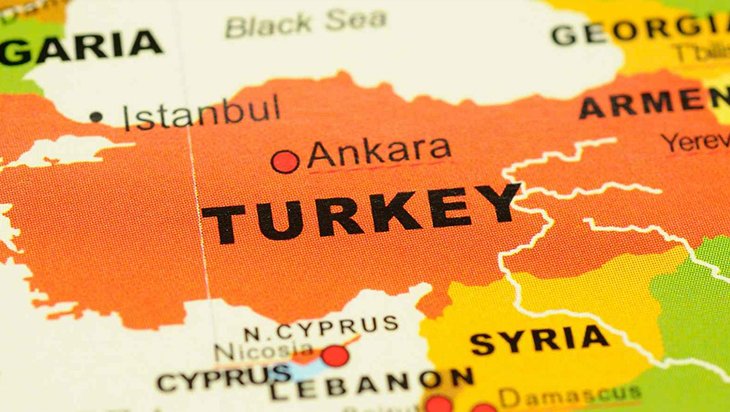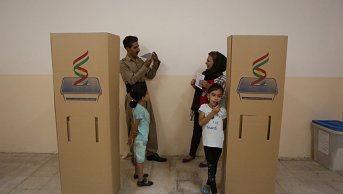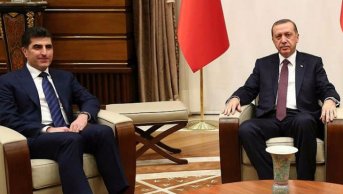Does really Turkey now turns to Middle East?

Shokhan Sherzad Qader
PhD student at Soran University/ International Relations Department
Since AK party came to power in 2002, and after the policies that they started to apply both domestically and internationally, so many questions started to be raised, and so many scholars, think tanks and researchers started to study Turkish case in their point of view. Among that one of the debatable issues was Turkey’s foreign policy which Turkey started to make many changes and it was argued that in many studies that Turkey turns to Middle East and prefers to engage with her neighbors.
This argument started to be supported by many theoretical and practical ways. One of the most prominent one was Ahmet Davutoglu’s doctrine which he insisted in his book “strategic Depth” and highlights “zero problems” doctrine with the neighbors. Davutoglu clearly claims his views in this book and insists on good relations with the neighbors and sees history and geographical location of Turkey as an opportunity opposite what had been viewed by the founders of Turkey. Practically Turkey started to review its relations with the neighbors and with the so many of the Middle Eastern countries, and started to create diplomatic and economic relations. This topic was debated by many, and so many scholars wanted to prove that Turkey beside of turning to Middle East but at the same time wants to apply its Islamism roots and reborn as a neo – Ottomans in the region. In spite of all what has been said, Turkey was always claiming to continue on their diplomatic relations with strategic partners with the west.
However the recent events between U.S. and Turkey and their crisis driven relations started to give the right to what have been argued regarding Turkish foreign policy, and started to raise questions if Turkey really now wants to turn to Middle East? And whether Turkey this time lost the trust toward the west and particularly toward U.S., and Middle East could be the best alternative now for Turkey? In order to find the most adequate answer to these questions we need to refer back to U.S. – Turkey relations both in short and longer term, so that we can find out the reasons behind deteriorating relations between the two countries.
If we look back to a longer term history between the two countries, we can see that they could maintain good relations generally; only time to time some kind of ups and downs could be noticed in their relations. The roots of their relations are going back the end of the Second World War, and particularly after the cold war. At that time U.S. wanted to build good relations with Turkey and to have a strategic partner against the Soviets influence, their relations started to enter to a stronger phase once Turkey entered NATO (North Atlantic Treaty Organization) in 1951. After the end of cold war, Turkey still tried to apply the policies which determined by the founders of Turkey and stayed close to her western allies internationally and secularization policies domestically. So both U.S. and Turkey relations based on mutual interests on many issues but most importantly security was playing a crucial factor, so Turkey supported the U.S. interventions on many issues in the Gulf and fighting terrorism after 11th September attacks.
But once AK party came to power an obvious deterioration could be noticed on many issues, such as Turkey’s rejection of entering U.S. to Iraq through Turkish borders, and Turkey’s position against sanctions on Iran, and so many different issues after the Arab uprisings which it was very critical for both sides in terms of security. However, during Obama’s administration attempts could be noticed from both sides to transfer the relations in to different phases, but still Turkey’s position questioned by U.S. regarding their engagement with the Middle Eastern countries especially with Israel which it had direct impacts on both of sides relations. What can be derived from that instabilities have always been noticed in their relations, and their relations driven on ups and downs time to time.
In spite of all, their relations have never been deteriorated in such a way that we are witnessing now. The tensions have arisen over U.S. citizen Pastor Andrew Brunson who has been detained by Turkey who accused of having connections with terrorist groups. So president Trump threated Turkey by “large sanctions” if they do not release the pastor. At the same time the Vice President of U.S. Mike Pence in a conference on religious freedom, again insisted on the pastor’s release with using harsh words against Turkey. However according to United Nations Charter article 2 insisting on the sovereign equality of all its members, so no state has the right to intervene to domestic issues particularly on judicial power.
On the other hand, in an attempt for a failed coup d’état in 2016 by the followers of Gulen who is living in U.S., a self – imposed exile since 1999. Turkey has requested Gulen many times to return to Turkey and stand for legal investigations, but U.S. refused the idea of sending back Gulen to Turkey, this is because according to U.S. Turkey blaming Gulen without evidence for carrying out the coup attempt. Apparently, the tensions between two countries mainly have started from this point, and till have turned the relations in to crisis.
With no doubt once AK party came to power, Turkey started to apply a multi – dimensional, and an independent policy opposite to what have been applied before. In this crisis driven relations with the U.S. Turkey focused on their positions and it doesn’t seem to be ready to give ground. Moreover, Erdogan the President of Turkey stated that if U.S. continues in using threats, Turkey will find other partners instead, so in this case Turkey as a NATO ally is very crucial on how to react and which steps will take in the near future.
Briefly saying, Turkey insisted on applying an independent policy and rejecting on only following the other countries policy has impacted in the relations with the U.S., especially with dealing with so many issues and events in the Middle East, this mostly appeared in their interests which are no more mutual but mostly quarreling. Furthermore, this crisis driven relations doesn’t seem to be ended – up only with only this event, the reactions by U.S. toward Turkey may seem to be over Pastor Brunson but they may have been rooted from other reasons behind this scene.
More importantly, after the sanctions by U.S. which lead to currency crisis, Turkish lira recorded lowest rates, but so many countries showed their support for Turkey, the crisis could be considered as a good chance to differentiate who is standing behind or against Turkey. One of the vast reactions came from Qatar and stated that they would be standing by its “brothers in Turkey”, and initiated for a huge investment with Turkey, and the two sides insisted on strengthening their strategic cooperation.
From all the events we can derive that Turkey won’t accept any risk on its economy as President Erdogan many times in his speeches insisted on the development of the economy and to become “the first ten economy” in the world, so economy has always played a crucial role for AK party since their governing, and it seems they have taken the right direction in preserving their own interests and apply their independent policy. It seems that Turkey will prefer to engage and again more with the Middle Eastern countries as a better alternative and they still can benefit from thier broad territory, geographical location and large population and use them as a resource to overcome any efforts of drowning Turkey.










